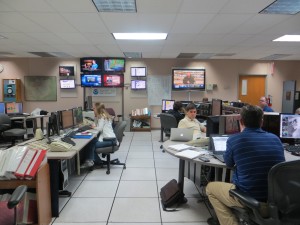 For many meteorologists, there’s nothing more rewarding than managing to get a job with the National Weather Service. This highly competitive agency is the national center for the study of weather patterns and the regular delivery of current forecasts, weather advisories, and other essential information for all Americans. Since the stakes are so high within this particular agency, however, landing a job with the National Weather Service isn’t as easy as many applicants might hope. The process of actually landing a job at the NWS begins when selecting an undergraduate or graduate institution, and requires students to keep their curriculum and work experiences aligned to agency expectations throughout their degree program and their professional experiences afterward.
For many meteorologists, there’s nothing more rewarding than managing to get a job with the National Weather Service. This highly competitive agency is the national center for the study of weather patterns and the regular delivery of current forecasts, weather advisories, and other essential information for all Americans. Since the stakes are so high within this particular agency, however, landing a job with the National Weather Service isn’t as easy as many applicants might hope. The process of actually landing a job at the NWS begins when selecting an undergraduate or graduate institution, and requires students to keep their curriculum and work experiences aligned to agency expectations throughout their degree program and their professional experiences afterward.
Start with the Proper Undergraduate Degree Program
Most aspiring employees of the National Weather Service structure their undergraduate college search in such a way as to align their very first courses with what the agency expects of its applicants after graduation. A very select number of colleges and universities throughout the United States have a fully aligned curriculum that meets the agency’s standards for both core curriculum requirements and professional skills. These programs have the right blend of meteorology coursework, advanced quantitative coursework, and electives that will teach climatology and other advanced sciences to students. Programs directly advertise to aspiring meteorologists with emphasis on their alignment with National Weather Service curricular standards.
Seek an Internship in Public or Private Sector Meteorology
As with virtually any professional occupation after college, employers will want to see that their applicants have secured at least a bit of professional experience that will allow them to “hit the ground running” in this high-stakes public service position. As a result, students in undergraduate programs should arrange for an internship in the industry as early as their sophomore year. This internship should be with an employer that specializes in acquiring and analyzing meteorological, atmospheric, or climatological data, since these are the three primary areas that the National Weather Service focuses on throughout the country.
In addition to acquiring professional skills and context, interns need to focus on building strong relationships with their coworkers and supervisors. Several professional recommendations are required of all applicants by the National Weather Service during the hiring process. Applicants who lack these key connections could find themselves at a potential disadvantage.
Graduate Programs Are Not Required, But Are Recommended
Finally, remember that the educational opportunities for weather experts don’t stop at undergraduate degree programs. The National Weather Service’s advanced standards for graduate education in meteorology have also been adopted by some of the nation’s best science and engineering schools.
Graduate degree programs will provide students with even more advanced skills in the field, better internship opportunities, and a clear way to differentiate themselves from the large pool of applicants for each National Weather Service job posting. For those weather enthusiasts who did not study meteorology at the undergraduate level, or for those students who did not complete a program aligned with National Weather Service standards, a graduate program in full alignment with the NWS will enable them to join the agency as well.
Related Resource: National Hurricane Center
Great Opportunities with the Right Qualifications
The National Weather Service is one of the hardest agencies to “crack” in terms of getting an interview and landing the job. As a result, students who wish to work for this agency will need to follow strict educational and experiential requirements. This is truly the only way to get a job with the National Weather Service in today’s competitive hiring climate.